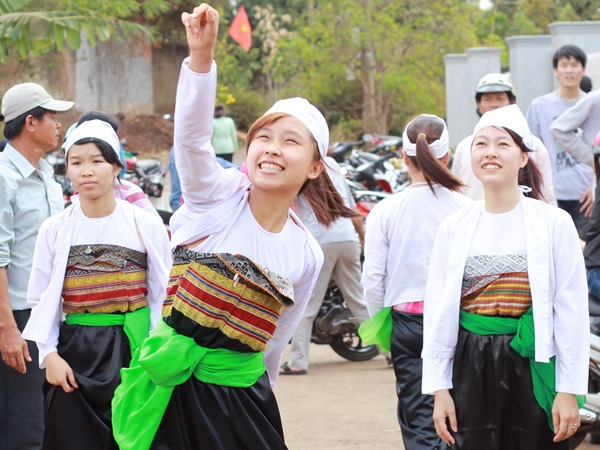The Mường (Vietnamese: người Mường) are an ethnic group native to Vietnam; it is the country’s third largest of 53 minority groups, with an estimated population of 1.26 million (based on the 2009 census and five years of population growth). The Muong people inhabit the mountainous region of northern Vietnam, concentrated in Hòa Bình Province and the mountainous districts of Thanh Hóa Province. They are most closely related to the ethnic Vietnamese (Kinh). The term “muong” of Thai origin means “cultivated land” or “community”. To emphasize their difference from the inhabitants of the valleys and highlanders, Muong call themselves “monglong”, which means “people living in the center”.
While the Muong are believed to be related to the Vietnamese, ethnologists have theorized that the Muong and Kinh (ethnic Vietnamese) separation happened when the proto-Vietnamese became heavily Sinicised, beginning from the 111 BC invasion by Chinese Emperor Wu of Han, while the Muong, living in the mountains, developed independently. The Muong and the Tai have had a mutual influence on each other’s culture, so today the Muong are ethnically and linguistically close to the Vietnamese, but culturally and socially similar to the Tai.

The Muong speak the Muong language, a close relative of Vietnamese. Writing based on the Vietnamese alphabet appeared in the 20th century while the Muong aristocracy were already familiar with Chinese writing through their study of the Confucian canon.
The Muong language is mainly used in the domestic sphere of communication. Most native speakers also speak Vietnamese.
The Muonges live in the north of Vietnam, mainly in the mountainous provinces of Hoa Binh and Thanh Hoa.
Around the city of Hoa Binh there are four large Muong population centers: Muonguang, Muongbi, Muongthang and Muongdong. Mainly, the Muonges settle in this area along streams and rivers.
The Muong have many valuable epics (Muong language: mo), such as Te tấc te đác (meaning: Giving birth to the Earth and the Water).
The main holidays of the Muong are New Year and agrarian holidays. During the celebration of the New Year Muong people pray to the ancestors. Such prayers are also arranged on the revolutionary holidays after which the whole village treats themselves to pre-cooked dishes.
Mainly, the Muonges follow Buddhism and Christianity (Catholics), often with local animistic influences. They believe in the existence of harmful spirits (ma tai, ma em, and others). In the past sorcerers sometimes used fear of spirits against people with whom they had personal disputes by declaring them carriers of the spirit ma tai. Deceived peasants beat and sometimes killed innocent people.
